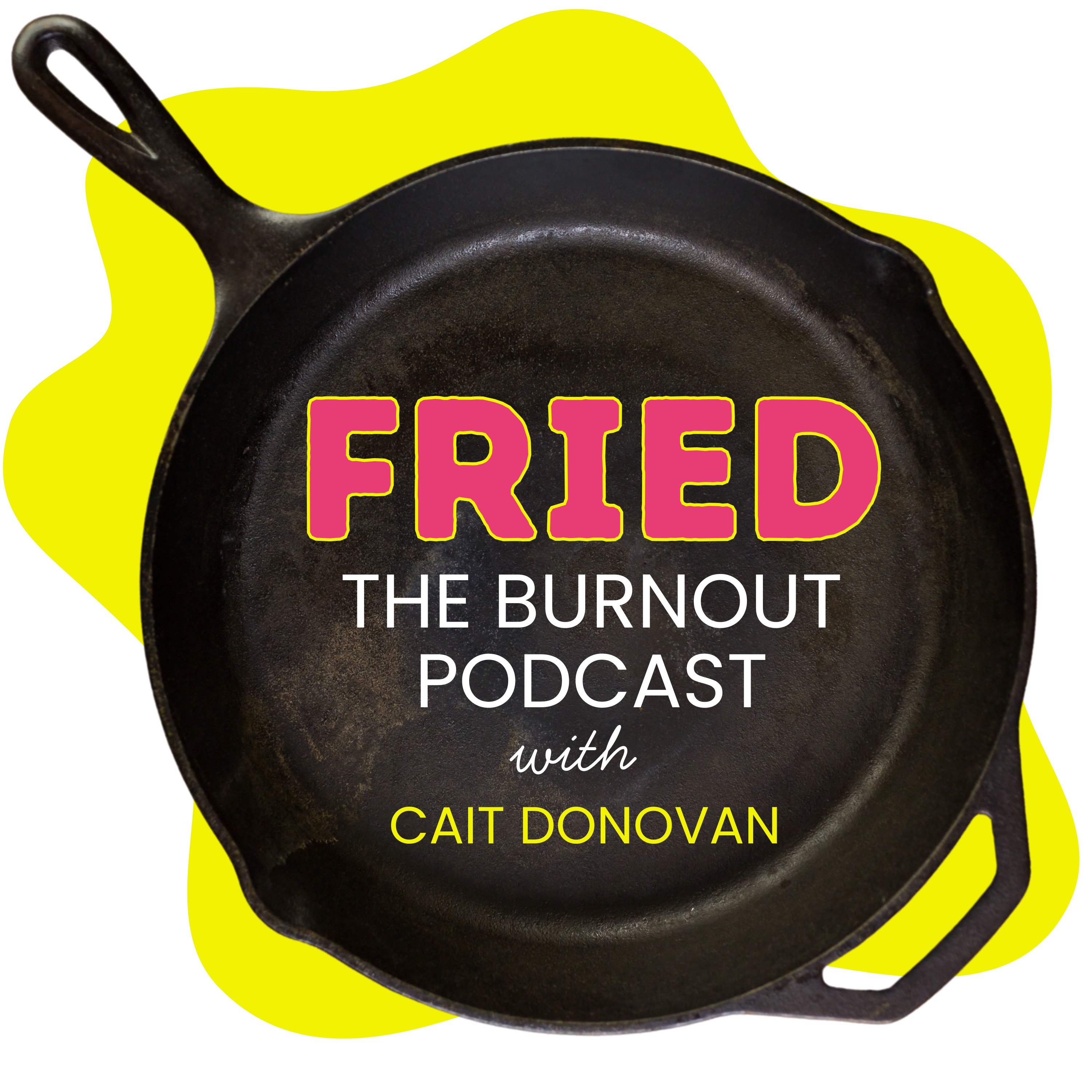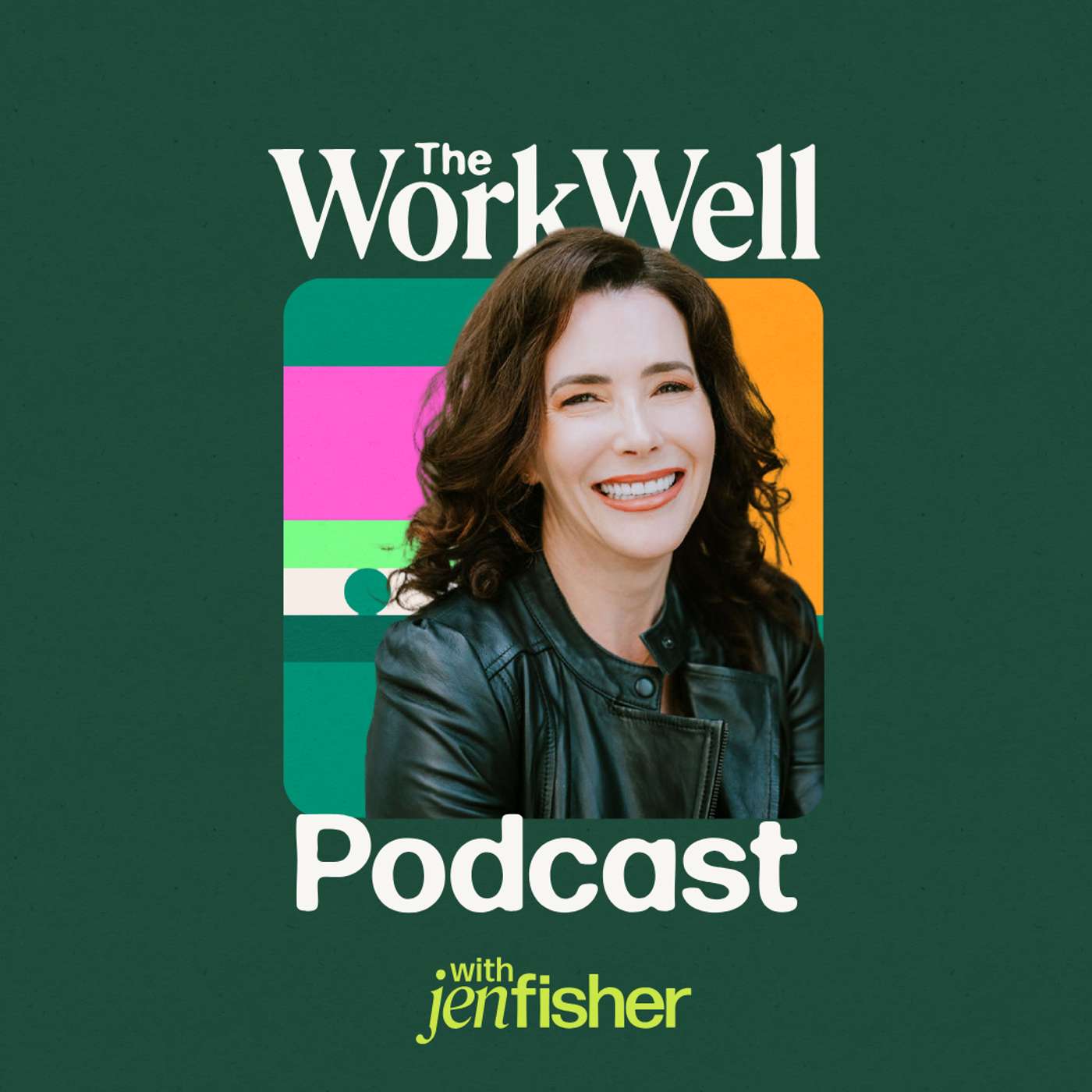.png)
The Balanced Badass Podcast®
The Balanced Badass Podcast® is the show for high-achieving professionals who want to prevent burnout, master work-life balance, and stay badass without losing their sanity.
Each episode, we’re not just tackling your overflowing calendar and keeping your household on track; we’re getting into burnout prevention and recovery strategies so that you have time to breathe, laugh, and savor that much-needed glass of wine at the end of the day.
Think of this podcast as your regular dose of practical advice, a touch of humor, and a little tough love, like catching up with a friend who just gets it. Whether you’re navigating burnout, balancing meetings and meal prep, or carving out moments of self-care, this is the space where we figure it out together.
Disclaimer: My content is for educational purposes only and not a substitute for professional medical or mental health advice. For serious concerns, please consult a qualified provider.
The Balanced Badass Podcast®
Losing Yourself in the Job
In this episode, we get into the dangerous cultural norm of equating our worth with our work.
We've become people defined by our job titles and productivity, fostering burnout and identity crises. By exploring the roots of this work-centric ideology, we uncover how to separate who we are from what we do.
Let's find out how to reclaim our identities beyond our resumes and build burnout-resistant lives.
Check out the detailed show notes (https://tarakermiet.com/podcast/) and leave your thoughts or questions about today's topic.
Got something to say? Text me!
-----
I’m Tara Kermiet, a leadership coach, burnout strategist, and host of The Balanced Badass Podcast®. I help high-achievers and corporate leaders design careers that are successful and sustainable.
Here, you’ll find tactical tools, leadership lessons, and burnout education that just makes sense.
👉 Start by taking my free Burnout Drivers Mini Assessment
😍 Join my community on Instagram (@TaraKermiet) and/or TikTok (@TaraKermiet) so we can stay connected!
🎤 Got a question, a topic you want me to cover, or just want to share your thoughts? I'd love to hear from you! Send me a DM or email.
Stay balanced, stay badass, and make good choices!
Disclaimer: My content is for educational purposes only and not a substitute for professional medical or mental health advice. For serious concerns, please consult a qualified provider.
[00:00:00] Somewhere along the way, we stopped being people who do jobs and started being people who are our jobs. We don't just introduce ourselves with our name, we lead with our title. Our work gets measured by our productivity, and we've built entire workplace cultures where overworking is expected. Boundaries are optional, and burnout is just part of the deal.
But what happens when your role changes? When you lose the job, when you're too exhausted to perform, that's when the identity crisis hits, and that's what this episode is about, because your job is not your identity. It never was. And if we wanna build burnout resistant lives, we've gotta start untangling who we are from what we do.
Let's start with a little context. In the US especially, we live in a work centric society. And I don't just mean that we work a lot, though we absolutely do. I mean, that work has become moralized. It's treated as a sign of virtue. [00:01:00] Busyness is celebrated, rest is kind of suspect, and slowness is judged. And success is something that's supposed to define you.
From the time we're little, we're rewarded for performance. You get praised for being productive, for finishing your chores, for getting those straight A's, and you're told you're such a good kid when you're responsible, self-managing and helpful. So you start to internalize the idea that being useful equals being lovable.
And then as you grow up, that pattern deepens you. Go from do your best to be the best, from try hard to win. And eventually you're encouraged to follow your passion, which in theory sounds great, but in practice, that message often gets distorted into something more like, make your passion your job, build your brand, monetize your gifts.
And if you're not doing what you love every single day, you're doing it wrong. [00:02:00] That's a heavy freaking load to carry. It turns career into identity and identity into performance. Historian Benjamin Honeycutt. Hopefully I pronounced that correctly. Anyways, he coined a term for this, he called it work, is he defines it as the belief that work isn't just necessary for economic survival, but central to our personal fulfillment and meaning.
It's the idea that work should be the source of your purpose, your passion, your creativity, your impact, and your social connection all in one. And in the US that belief is treated almost like a religion. You sacrifice for it. You organize your life around it. You measure yourself against its expectations.
We're swimming in a culture that makes it nearly impossible to separate our sense of self from our careers, and in some ways it makes sense. Work gives us structure. It tells us where to be and [00:03:00] when. It gives us some clear goals, feedback, and opportunities to grow. It offers a role to play, a status to occupy.
And for a lot of us, our jobs are where we felt the most capable, the most helpful, and the most visible. We're not just doing a task, we're showing up as the leader, the problem solver, the strategist, the helper. And because those roles feel good and they give us a sense of control and identity, we start to lean on them more and more over time.
Something subtle happens, though work starts to feel essential to who we are. You stop saying, I work in marketing, and you start saying, I'm a marketer. You don't just work as a nurse. You are a caregiver. You don't just manage projects. You are the responsible one. And when your identity narrows down to what you produce, who you serve, and how well you're perceived in your role, everything else starts to shrink.
You [00:04:00] stop feeding the other parts of your identity and eventually you reach a breaking point. Because when your job becomes your only anchor, any threat to your role, whether that be a tough review, a restructure, a change in leadership, a slow season, a health crisis, whatever it is, it doesn't just disrupt your routine, it destabilizes your identity.
You're not just having a bad day at work. You're unraveling because when your sense of self is fused with your output. Every wobble feels like a collapse, and this is where we have to stop calling it stress and start naming it for what it really is, A psychological identity crisis. Let's zoom in on what's actually happening under the surface, starting with fragile self-esteem.
When you tie your worth to your performance, your confidence becomes conditional. It's only strong when things are going well, but the second there's criticism, [00:05:00] rejection, or even a moment of self-doubt, that fragile self-image starts to crack. You're not just asking if you messed up. You're asking if you're a complete failure.
And because the line between work and self is so blurred, the answer feels deeply personal, even when it shouldn't. That's where self discrepancy theory comes into this is the psychological gap between your actual self, the messy human, inconsistent you and your ideal self. The perfectly polished, always on version that you think you should be, and the bigger that gap gets, the more distress it causes.
Shame, anxiety, self-criticism, imposter syndrome, they all feed off that gap. Yeah. Over time, this mental and emotional strain builds into something called role engulfment. That's when one identity, your job in this case becomes so central, so dominant that it swallows [00:06:00] everything else. Your friendships fade, your hobbies disappear.
Your sense of curiosity or adventure shrinks even the way you describe yourself. Changes. You stop saying things like, I love to write, or I'm someone who really values connection, and you start saying, I'm the senior manager of X, or I run a team that does Y. Your resume becomes your personhood, and that's exhausting.
There's another layer here too, ego depletion. It's what happens when you spend your entire day shape shifting to meet the demands of your professional identity. You're constantly self-monitoring. Regulating your tone in meetings, anticipating what your boss wants, smoothing things over with your team, responding calmly when you're actually seething inside and doing all of that while your brain is juggling the tasks, the deadlines, and the decisions that you need to make.
Eventually your emotional and cognitive energy just runs [00:07:00] out. Your nervous system is shot. You stop being able to do the basics, let alone the big stuff. You don't just feel tired, you feel untethered, unrecognizable to yourself like you're watching your own life through glass and wondering how the hell did I get here?
This is the moment where you hold up the metaphorical mirror. If I took away your job title, if your calendar emptied out tomorrow. If your email account was deleted and no one needed anything from you professionally for the next six months, who would you be? Not. What would you do, but who would you be if your only introduction was your name, what else would you say about yourself if you couldn't rely on your title, credentials or LinkedIn bio?
What would you offer up as your anchor? Most people can't answer that. Not easily anyway, and I know [00:08:00] that because I couldn't answer it either for a long time. For a while, my identity was my job. I was a student affairs professional, then. I was an instructional designer. My sense of self lived and how many people needed me, how many meetings I was in, and how well I was performing.
When meeting someone new, I'd rattle off my job description. I'd tell them what I do, not who I am. And I sure as hell didn't realize how much of myself I had handed over until I was burned out and sitting in silence trying to remember what the hell I liked, what I wanted, what brought me joy, and I didn't have an answer.
I just kept coming up empty. So hold up the imaginary mirror and ask yourself, where did I go? What parts of me have been quiet for too long? What identities have I neglected because they didn't make me money or didn't get praise? What do I miss about myself? There's a version of you underneath your professional role, [00:09:00] one that's messy, complex, and multidimensional.
We just gotta get back in touch with that. We Now, here's what I do know for sure. Once you realize your job has become your identity, it's really hard to unsee it. You start noticing how often you introduce yourself with your title. You catch, how much your mood depends on how work went that day.
You feel that anxiety creep in when things slow down because without being productive, you are not sure what to do with yourself. You're dealing with a full on identity shakeup, and it's not glamorous. It's quite weird. It's uncomfortable, and it can be slow. And here's the part where a lot of people just want the fix.
They want the bandaid to make the booboo feel better. And I get it because none of us like sitting in this kind of discomfort. But here's what I'll tell you. You don't rebuild by jumping into action. You rebuild by learning how to be with yourself [00:10:00] again. And for a lot of folks, that's actually way harder than staying busy.
You've spent years being praised for being the one who keeps it all together. The one who steps up, who gets things done. So the idea of not knowing who you are without all of that, it's quite disorienting. And it might even be embarrassing.
You might feel like a grown adult who somehow forgot how to be a person. And that's okay. That's where most people are when they hit this point. The truth is we're not taught how to build an identity that isn't centered on work. No one shows us how to answer the question, who are you? Without rattling off a job title?
We don't learn how to build a full life. We learn how to build a resume. So when you try to slow down or explore what else might be part of you, it could feel pointless and awkward. You might pick up an old hobby and immediately wonder what's the point. You might have a quiet [00:11:00] weekend and feel guilty the whole time because you didn't use it well.
You might try to rest and then panic because you feel invisible when you're not being useful. All of that is normal. You are trying to remember who the hell you are when no one needs anything from you, and it can be frustrating. You're going to want to turn it into a project. You're gonna feel the urge to be good at rebuilding and to get it right.
That's also normal because that's your old wiring talking. But this is more about subtraction than addition. We want less pretending, less overextending, less saying yes when you mean no. What I don't want is for you to try to become some new, shiny, idealized version of yourself. I want you to clear out all the noise so that you can just hear yourself again, and start with awareness If you don't know who you are outside of work.
Start by tracking where your time, energy, and thoughts are going [00:12:00] right now. Pull out your calendar and ask, who am I when I'm not doing all of this? If all your time is spent in meetings, prepping for meetings, recovering from meetings, that's not just a work schedule. That's your life, and noticing that without judgment is the first step to changing it.
Then ask yourself what gets pushed to the bottom of the list every week. Is it movement for your body, rest, relational, connection, fun. Anything that isn't productive? Next, thinking categories, not goals. You don't need a bucket list. You need buckets of identity, different parts of your life that make you feel like you ask yourself, where do I feel most like myself?
What used to make me lose track of time? What spaces or people don't care what I do for work. Start carving out 15 [00:13:00] minutes for that version of you to exist. That's how you start to build identity breadth. Not a whole new life, just more life around your work life.
You are not trying to escape your job. You're trying to stop shrinking your entire self to fit inside it. So maybe that means taking one night a week to not open your laptop. Maybe it means reconnecting with someone who knows you outside of your professional persona. Maybe it's picking up something you used to love and doing it just to do it, not to monetize it, not to post on social media about it.
Not to even be good at it, just to do it just for you, because the goal here isn't balance. It's separation space between you and your job room to breathe room to be a person. So here's what I wanna leave you with. You don't need to burn your career to the ground to [00:14:00] get your identity back. You don't need to make some huge sweeping life change.
But you do need to stop building your entire sense of self on something that can disappear with a budget cut, a reorg, or a bad month. I'm not here to tell you to be less passionate. You're allowed to care about your work. You're allowed to be ambitious, to lead, to go after the big role, the big mission, the big impact.
But I am here to tell you that you're also allowed to matter outside of your performance. You're allowed to be a whole person with needs, with desires that have nothing to do with your output, with value that exists even when you're resting and when you're not proving anything to anyone. You are never just the job.
And the more you remember that, the more resilient, grounded, and human your life will become. That's all I have for this week. If I can support you in any way, [00:15:00] please reach out on Instagram or TikTok and I just hope you have a good rest of the week and I'll see you in the next episode. Take care, friend.
Podcasts we love
Check out these other fine podcasts recommended by us, not an algorithm.

Happier with Gretchen Rubin
Gretchen Rubin / The Onward Project
The Gratitude Attitude Podcast
thegratitudeattitudepodcast
Before Breakfast
iHeartPodcasts
A Bit of Optimism
Simon Sinek
Oprah's Super Soul
Oprah
Stuff You Should Know
iHeartPodcasts
Unlocking Us with Brené Brown
Vox Media Podcast Network
We Can Do Hard Things
Treat Media and Glennon Doyle
Take Out Therapy: End Overthinking & Overwhelm for Empathic High Achievers
Rebecca Hunter, MSW
FRIED. The Burnout Podcast
Cait Donovan, Top Burnout Expert for Corporate and Nonprofit Organizations
